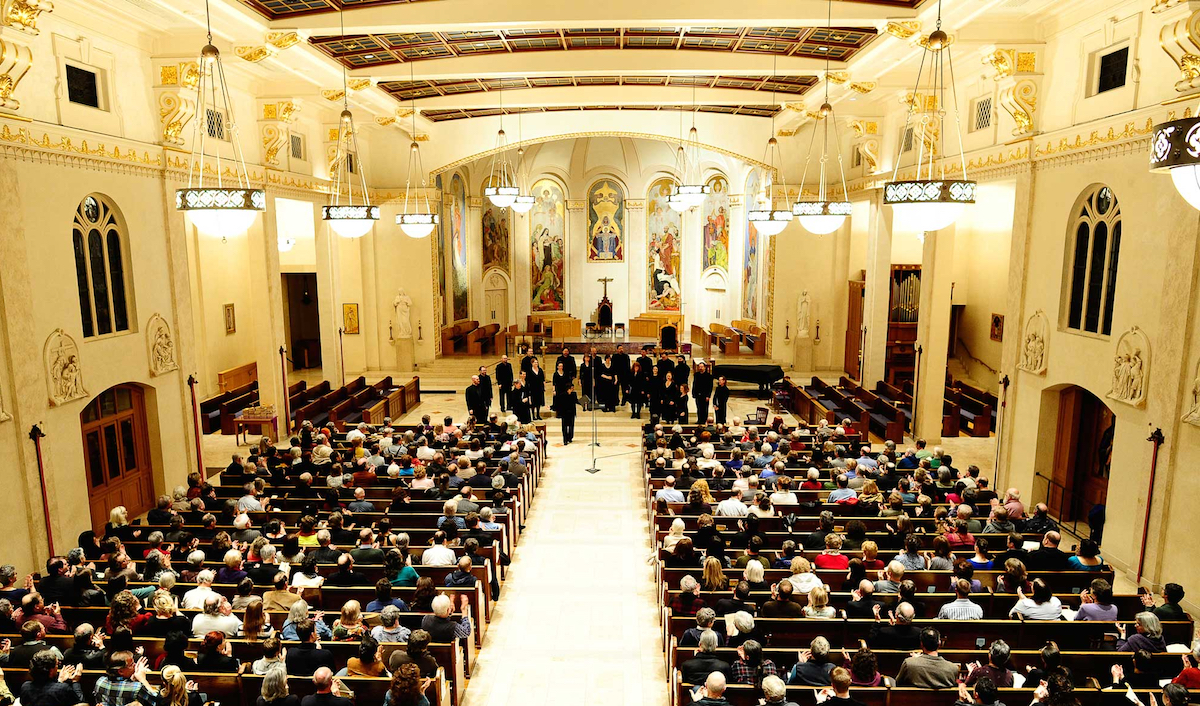Thursday, February 2, 2017
Arvo Pärt Festival at Trinity Episcopal Cathedral, St. Mary’s Cathedral, Kaul Auditorium Reed College, Studio 2 & Northwest Film Center Portland: Feb 5 - 12
This month, the Portland ensemble Capella Romana presents the first-ever North American Festival dedicated to the work of Sacred Minimalist and Estonian Orthodox composer, Arvo Pärt. As a professional vocal ensemble that performs early and contemporary sacred classical music, the ensemble is known especially for its presentations and recordings of medieval Byzantine chant, Greek and Russian Orthodox choral works, much in the way of Pärt's regular collaborators, The Hilliard Ensemble. The form of the larger percentage of Arvo Pärt's work came after a period of creative crisis and reflection following his 1968 "Credo", and transitional "Symphony Number 3". Previous to this 1971 orchestral work, Pärt had explored a range of styles influenced by the early 20th Century Soviet era works of Shostakovich, Prokofiev, and Bartók. A brief period of exploring Serialist and Twelve-Tone methods informed by the techniques of Arnold Schönberg was to follow. These shortly proved to be both a creative impasse, as well as drawing undesired attention from the Soviet authorities, as detailed in "Oxford Study of Composers: Arvo Pärt" by the composer's biographer, Paul Hillier. His course out of this impasse came in the study of Plainsong, Gregorian Chant and the emergence of early Polyphony in the European Renaissance. From this the creation of Pärt's defining tintinnabuli style (from the Latin for “small ringing bells”) was generated. An approach which the composer has described: “I work with very few elements – with one voice, with two voices. I build with the most primitive materials – with the triad, with one specific tonality. The three notes of the triad are like bells. And that is why I call it tintinnabulation”. The creative breakthrough enabled him to resume composing and a stream of what are considered his masterpieces followed, with "Tabula Rasa", "Fratres", "Spiegel im Spiegel" and the "Cantus in Memoriam Benjamin Britten", written in rapid succession in the mid-to-late 1970s. These all finding a home in the west on the groundbreaking Nordic jazz and contemporary classical label, ECM. Dana Jennings "ECM: Albums Know that Ears Have Eyes" for the New York Times, mines the ensuing four decades of output from the label, including the vast majority of Arvo Pärt's catalog of recordings.
While this month's event marks the first domestic festival dedicated exclusively to his music, there have been numerous performance series and showcases of the Estonian composer's work stateside. Notably a series in Manhattan at the time of the extensive New York Times Magazine feature of 2010, "Arvo Pärt: The Sound of Spirit". New York again hosting 2014's Carnegie Hall week of performances comprising the Arvo Pärt Project by the Estonian Philharmonic Chamber Choir and Tallinn Chamber Orchestra. Which was covered in The Times feature, "His Music, Entwined With His Faith: At Heart of Arvo Pärt’s Works, Eastern Orthodox Christianity". One of the great chroniclers of 20th Century classical music, Alex Ross, host of The Rest is Noise, produced an exceptional overview of the composer's life and work for The New Yorker, "Consolations: The Uncanny Voice of Arvo Pärt". Ross also present at the Pärt's 80th birthday celebration throughout the city, which included a 24 hour marathon on New York's WQXR and New Juilliard Ensemble concert at the Metropolitan Museum of Art. Outside of New York, other notable events have included, "A Symphony for Los Angeles, Just One Otherworldly Delight" presented in Los Angeles Philharmonic's Mozart & Pärt Festival of last year. The United Kingdom has played host to some of his most significant works, including 2015's Manchester International Festival. Wherein the composer collaborated with Abstract Expressionist painter, Gerhard Richter producing a work grappling with differences in art’s direct messages and allusions, "History is Everywhere and the Present is Fleeting". Alex Ross again playing a pivotal role in London Southbank Centre's 2013 The Rest is Noise Festival featuring Pärt among a set of Eastern European composers in a showcase titled, "Late 20th Century Politics and Spirituality", on the changing political and social landscape of the 1970s and 80s shaping of the era's mood and music. Pärt's home country of Estonia is no stranger to his works, this past year saw the release of "The Lost Paradise", a documentary on the famously media-averse composer's collaboration with director Robert Wilson. Framed around the staging of “Adam’s Passion” featuring three key works by Pärt in Tallinn's Noblessner Foundry, a former submarine factory. Its creation is followed in documentarist Günter Atteln's account of their time together during the many months of the project's genesis and development, "My Year with Arvo Pärt: He is a Man of Courage, Humility and Authenticity".

